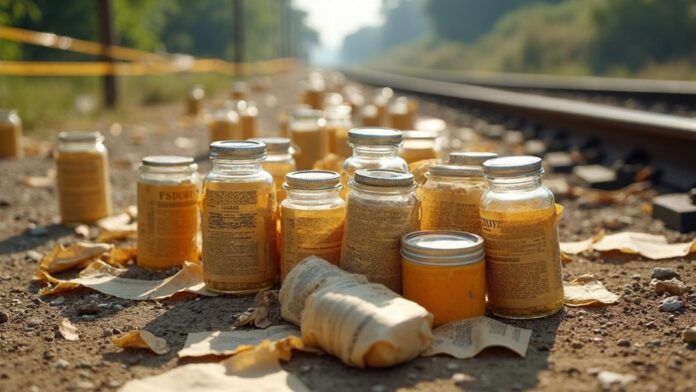Multiple jars containing preserved human body parts, including an 18-20 week old male fetus from 2020, were found at a garbage dump in Daund, Pune district, on March 25, 2025. This discovery led investigators to trace the remains to Bhangaale Hospital’s unauthorized preservation practices. The revelation, reported by locals at approximately 9:30 am near Jijamata Nagar and Borawake Chowk, raises serious ethical implications regarding hospital regulations and proper biomedical waste disposal protocols. The remains were discovered near a petrol pump in the area.
Officials uncovered 10-11 glass and plastic containers holding various human organs, including breast tissue, testicles, uterus, placenta, ovarian cysts, and an appendix. The male fetus, delivered prematurely on August 30, 2020, had been preserved in formalin solution for nearly five years at Bhangaale Hospital, allegedly for educational purposes at their nursing college, though without proper authorization under the Anatomy Act, 1949.
Inspector Gopal Pawar announced that the preliminary investigation findings suggested a connection to a nearby nursing home. The Pune Rural Police, responding to reports from concerned citizens, seized the containers and initiated an investigation that quickly focused on Bhangaale Hospital in Gopalwadi, Daund. Through labels found on the jars, investigators identified patients who’d undergone surgical procedures at the facility, leading to the recording of their statements and establishing a clear connection to the hospital’s improper disposal practices.
The case initially included charges of illegal abortion but has since shifted to focus on negligent handling of biomedical waste and environmental violations. The Daund Sub-District Hospital medical superintendent has issued a show-cause notice to Bhangaale Hospital, while authorities continue investigating the facility’s unauthorized storage of human remains and their decision to dispose of the preserved specimens through a scrap collector.
The ongoing investigation seeks to address several critical questions, including the rationale behind preserving the fetus for over four years without proper disposal or cremation. DNA testing is currently underway to identify the parents of the fetus, while investigators examine the broader implications of the hospital’s practices regarding human tissue storage and disposal.
The case highlights significant breaches in biomedical waste management protocols and raises concerns about oversight in medical facilities’ handling of human remains. The incident has prompted increased scrutiny of local healthcare facilities’ compliance with biomedical waste regulations and storage protocols for human tissue samples.
Authorities continue gathering evidence and testimonies from hospital staff and affiliated personnel to establish accountability for these violations and prevent similar incidents in the future.

